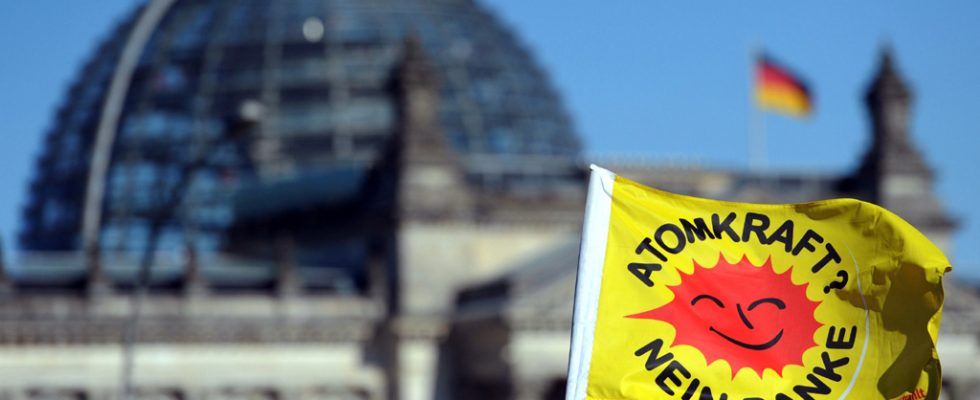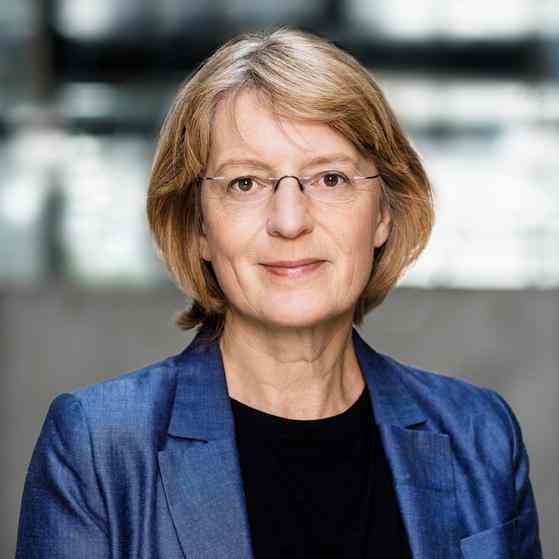analysis
Status: 04/14/2023 5:51 p.m
The fight for nuclear energy shaped German politics for decades – the Greens owe a large part of their success to the debate. After many U-turns, it should finally be over.
Environment Minister Jürgen Trittin laid the foundation for the nuclear phase-out in 2001 after a struggle with his own party. Now it is his successor Steffi Lemke, again a green party member, who is responsible for the keystone on the deadline of April 15, 2023. No more delays, a clear rejection of all further postponements.
It was a long way to get here – from the nuclear enthusiasm of many politicians to nuclear skepticism, from the Ministry for Nuclear Questions set up under Konrad Adenauer in 1955, which he entrusted to Franz-Josef Strauss, to the nuclear phase-out. Whyl, Brokdorf, Wackersdorf, Gorleben – they all become symbols for the fight against nuclear power. Like the sticker with the bright sun and the striking “Nuclear power – no thanks!”
Protests that connect generations and lead to the founding of a party: “Without the anti-nuclear movement,” said Jürgen Trittin in a recent interview, “the Greens would be inconceivable.”
Disasters lead to rethinking
Two catastrophes also make politicians from other parties rethink: 1979 the nuclear meltdown in Harrisburg, 1986 the disaster in Chernobyl. The answer of the then Union-led federal government: Helmut Kohl creates a Ministry for the Environment, Nature Conservation and Nuclear Safety. Also a demonstrative signal to the Greens, who entered the Bundestag for the first time in 1983, with the clear demand for an immediate halt to the construction and operation of all nuclear power plants.
After the Chernobyl disaster, the SPD also changed its position on nuclear energy and decided to phase it out. One of the most prominent spokesmen is Erhard Eppler. He remembers the party conference in 1986. “I got the feeling that some people are a bit naïve, they think it will be easy. We had set a time frame of ten years for the exit, and I said, don’t imagine that it’s so easy.”
Federal Environment Minister Jürgen Trittin laid the foundation for Germany’s nuclear phase-out.
Fast forward position change
Eppler is right. In December 2001, the red-green government succeeds in passing the nuclear phase-out law, the first two nuclear power plants go offline, but then, under Gerhard Schröder’s successor Angela Merkel, there is a phase-out. A decision that doesn’t last long.
Again, it is a nuclear catastrophe and the subsequent anti-nuclear protests in their own country that are causing politicians to rethink. Until Fukushima, the chancellor only had doubts about the safety of nuclear power plants in the east, but now she is fundamentally rethinking it. The physicist admits, “Fukushima has changed my attitude towards nuclear energy.” If such an accident happens in a high-tech country like Japan with the highest safety standards, then even Germany cannot simply go back to business as usual. The decision finds a broad majority in the Bundestag, including in the Union and the FDP. For many, that means a fast-forward change of position.
Traffic light stress test
The end of 2022 should really be over. But the original schedule is faltering. In order to secure the energy supply in the crisis after Russia’s attack on Ukraine, Economics Minister Robert Habeck is proposing an extension: Two southern German nuclear power plants are to go into reserve operation – in an emergency if there is not enough energy available.
The issue of nuclear power is increasingly becoming a traffic light stress test. Not only the opposition Union, but also the FDP is not enough. The FDP insists on longer running times until 2024. The Greens, for their part, confirm that short-term continued operation is only an option for the two southern German reactors.
Finally, the chancellor ends the argument with a word of power. It allows the Isar 2, Emsland and Neckarwestheim 2 nuclear power plants to be operated until April 15th. After that it’s over. After a heated debate, the Bundestag finally agrees.
FDP and Greens get stuck
For the Green Economics Minister, the nuclear phase-out is “irreversible”. The energy supply is secured, even without nuclear power, he assures. In his opinion, this is due to the high filling levels in the gas storage facilities, new liquid gas terminals and renewable energies.
Nevertheless, criticism continues to hail. Above all, the FDP and Greens get stuck in their positions. FDP parliamentary group leader Christian Dürr brings up the proposal to at least keep the three nuclear power plants in reserve and not start dismantling immediately. You can “start it up again” if a difficult situation arises, says Dürr in the daily topics. As before, he argues, there are challenging times in terms of energy policy.
Nonsense, comments the Greens politician Trittin the advance of the FDP. Environment Minister Lemke also rejects the demand as illegal. Your ministry refers to the Atomic Energy Act. There it is stipulated that the authorization to operate the three remaining nuclear power plants ends at the end of April 15th. A spokesman explains that the reactors in the plants would be shut down that day and electricity production would end. The owners are obliged to shut down and dismantle the nuclear plants. It is said that keeping the nuclear power plants available as a reserve would be a violation of the Atomic Energy Act.
The debate is not over
A reserve operation, as brought into play by the FDP, would be an extremely unlikely scenario. Nevertheless, FDP finance minister Christian Lindner calls it regrettable “that there is no majority for at least keeping the German nuclear power plants in reserve.” To then make it clear to the coalition partners, the Greens and the SPD: “Those who bear political responsibility for the energy supply in the cabinet for their position must be aware of their responsibility.”
The exit is there, but the debate is not over. The Union continues to raise spirits and considers a revival of nuclear power in Germany to be possible even after April 15th. Warming up for a campaign issue? While the Greens in particular see themselves on target. One of the central demands she has made since the party was founded is now becoming a reality, “the start of a new era of energy production,” as Environment Minister Lemke calls it.


